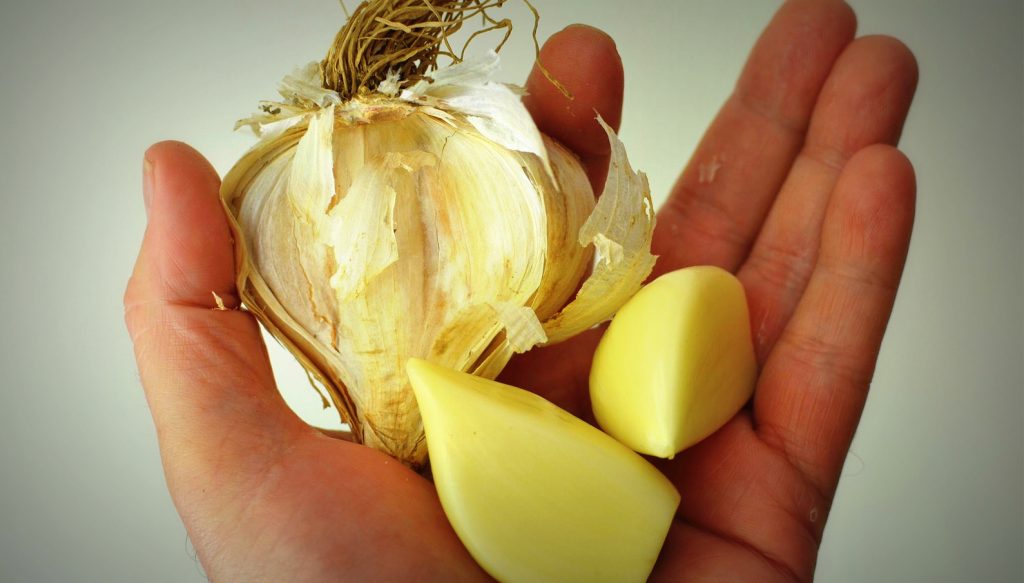Garlic: Roto-rooter for the arteries?
(GreenMedinfo | Sawer Ji, Founder) One of the most common kitchen staples could prove to also be one of the most effective natural treatments for heart disease.
Heart disease is the #1 killer in the modern world. It’s the reason why millions pop aspirin, blood pressure, or statin drugs daily in the hopes that they might reduce the risk of a sudden and premature death. But pharmaceutical approaches to prevention carry with them such profound health risks that, in most cases, the jury is still out as to whether they do more good than harm. Here at GreenMedInfo.com, we have a strong belief (and therefore bias) that natural substances are superior to synthetic ones in preventing and treating health problems. We also focus on bringing to light research on the unintended, adverse effects of these commonly employed pharmaceutical interventions, as they are underreported in popular media. That said, as an “evidence-based” platform we make a concerted effort to defer to the authority of peer-reviewed and published scientific literature, which when closely inspected, lends remarkably consistent support to our core advocacies. You can view literally thousands of studies we have gathered on natural ways to prevent and sometimes reverse heart disease via our newly redesigned Research Dashboard by searching any number of over 10,000 categories, from arterial calcification to high blood pressure to heart attack.
Why The Drugs (Patented Chemicals) Won’t Work
A quick word about commonly ingested and putatively heart-friendly drugs for the primary prevention of heart disease…
First, let’s acknowledge that heart disease is not caused by a lack of a drug. This point is so obvious that it often seems to escape the attention it deserves. To the contrary, it is exposure to tens of thousands of chemicals (many of them drugs) that did not pre-exist the industrial revolution in the late 19th century that is one of the major, if not the primary reason why we have a heart disease epidemic. Of course, nutritional and lifestyle factors (e.g. smoking) play a huge role, but being exposed to chemicals and drugs that shouldn’t be in the body (outside their occasional use in emergency medicine where they can be life-saving) is a sorely underreported part of the puzzle.
Aspirin, for instance, has been linked to over 50 serious side effects, the top 7 of which we documented in our previous report, The Evidence Against Aspirin and For Natural Alternatives. Statin drugs are even worse. Not only are the statistics manipulated to make them seem far more effective than they actually are, but we have identified over 300 adverse health effects linked to their use. Should we be surprised? The body is comprised, molecule by molecule, cell by cell, of natural substances not synthetic ones. Therefore what’s not natural is perceived by the body as xenobiotic (“foreign to life”), rejected if possible, but almost always leadsing to a wide range of adverse effects that are at the root of many health conditions that are, in turn, treated with more chemicals to suppress or mask the symptoms of chemical poisoning. It’s a truly vicious cycle. Some call it the medical merry-go-round.
Why garlic may save your heart (and your life)
Given the uncertainty that comes with taking pharmaceuticals — basically patented chemicals, ostensibly to “improve health” or “reduce disease risks” — natural alternatives are receiving far greater attention today than ever before. And rightfully so! Literally thousands of years of cross-culturally confirmed positive experience is backing their use, including a glut of relatively recently performed scientific research.
We’ve looked at a wide range of natural alternatives to drugs for heart disease in previous posts, with pomegranate, turmeric, and sesame seed demonstrating extraordinary cardioprotective properties, to name but a few. Garlic, however, may be the most compelling of them all from the standpoint of clinical research, given that numerous recent studies now show this amazing herb can prevent and even reverse the accumulation of calcified plaque in the arteries. This is, of course, the goal of root-cause resolution medicine: to address and ameliorate the underlying pathologies, instead of simply suppressing symptoms or surrogate markers of cardiovascular disease risk such as LDL cholesterol. Take a look at one of our previous reports on the topic of garlic’s artery de-calcifying properties here.
The most recent clinical study on the topic of garlic’s heart-disease healing properties was just published in the journal Nutrition and entitled, “Aged Garlic Extract Reduces Low Attenuation Plaque in Coronary Arteries of Patients with Metabolic Syndrome in a Prospective Randomized Double-Blind Study.” It looked at whether or not aged garlic supplementation could reduce the volume of so-called low-attenuation plaque in the arteries of patients suffering from metabolic syndrome. Metabolic syndrome includes a constellation of health problems, including high blood pressure, high blood sugar, excess body fat around the waist, and abnormal cholesterol levels. This condition greatly increases the person’s risk for heart attack and stroke, and often occurs alongside atherosclerosis.
Although several previous studies have demonstrated that aged garlic extract (AGE) inhibits the progression of coronary artery calcification, its effect on noncalcified plaque (NCP) has not been clearly demonstrated to be effective in a randomized, placebo-controlled clinical trial.
The new study involved 55 patients with metabolic syndrome, with an average age of 58.7 and 71% men. They were divided into two groups (27 orally administered with 2400 mg a day of aged garlic) and 28 placebo. The intervention lasted an average of 354 days.
The patients were maintained on current medications such as aspirin, hypertensive, or hyperlipidemia medication, and did not change medications during the study period.
The results showed a significant decrease in low-attenuation plaque volume (-1.5% ± 2.3%), compared with an increase of 0.2% ± 2.0%, in the placebo group. Low-attenuation plaque is associated with ischemia risk (inhibited blood supply) in atherosclerosis, a factor in poorer prognosis.
The clear conclusion of the study was that aged garlic prevented plaque buildup in the arteries. When compared to the increase in plaque volume in the untreated group, clearly the intervention has life-saving implications in that it actually reversed the progression of atherosclerosis.
How does garlic work?
The researchers surmised that garlic possesses a number of therapeutic properties that occur simultaneously to stabilize atherosclerosis. Those primary properties are:
- Cholesterol-reducing effects
- Blood vessel dilating effects (blood pressure lowering)
- Anti-inflammatory effects
- Antioxidant effects (inhibiting LDL oxidation)
When you consider the diverse ways in which garlic expresses its cardioprotective actions, it is what you could call a “poly pill.” For decades the pharmaceutical industry has been trying to reproduce the spectrum of benefits witnessed in natural substances with a patented chemical capable of doing the same thing. The industry has clearly failed. In fact, drugs like statins carry over 300 distinct risks for adverse effects. You can view the statin database on our website to see the evidence for this astounding evidence of its toxicity.
We have additional research on our garlic database which reveals the cardioprotective properties of this remarkable herb. We have created a public page for 16 studies on the topic here, as part of our professional membership tool set functionality called “create public page.” [Learn more about Professional features here]
Garlic is a powerful, time-tested, safe, affordable and easily accessible natural healing agent with dozens of documented side benefits. Those on medication, such as a blood thinner, should be mindful not to take it in “nutraceutical” concentrations without the guidance of a trained medical professional. For those who have opted out of conventional, drug-based approaches we can only opine that the best thing would be to let your food, and herbs like garlic, be your medicine, if you so choose to exercise your free will.
Source: GreenMedinfo
Je zou ook interesse kunnen hebben in:




